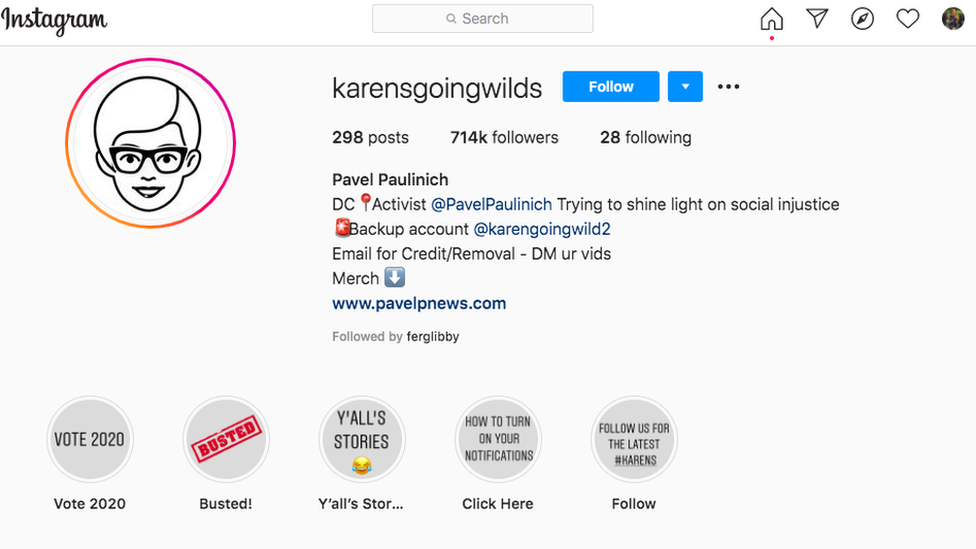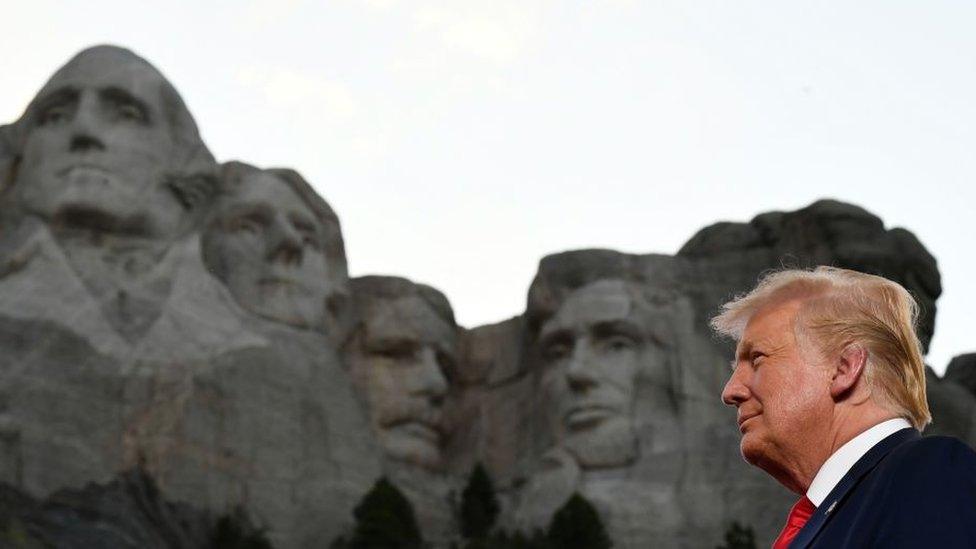What is the cost of 'cancel culture'?
- Published

Pavel Paulinich was working as a chef in Washington DC when coronavirus shut down most of his industry.
With more free time on his hands, Mr Paulinich began to focus on his social media accounts, including a new page he created called Karens Going Wild.
For a while, Mr Paulinich, who is originally from Peru, says he was hearing stories from friends about prejudiced interactions and seeing a growing number of videos posted online that showed racist behaviour across the US.
He wanted to do more to ensure these incidents got public attention and he says he wanted to form a "safe space" for those who filmed the videos to publish them.
The account - which has more than 700,000 followers on Instagram - posts images and videos of individuals behaving in prejudiced and bigoted ways. It was receiving so many submissions that Mr Paulinich created a second back-up account.
The title Karens Going Wild refers to a popular meme, "Karen", seen as an entitled or demanding person, typically a white woman, who often expresses racist or prejudiced views.

The goal for Mr Paulinich and activists like him is to use social media to draw attention to these actions, publicly shaming the people involved and ultimately getting the people "cancelled".
"These times of doing whatever you want without consequences are over," he says.
For those at the receiving end of cancel culture, the consequence can lead to loss of reputation and income that can be hard to recover from.
Critics of cancel culture say that it is the equivalent of letting an angry mob decide a person's fate. Worse still they argue, it stifles free speech, preventing some from voicing opinions out of fear they will be personally attacked.
"Right or not, people have such a propensity to make a statement or make a comment without knowing all the facts," explains Denise Graziano, chief executive of marketing firm Graziano Associates.
She argues businesses need to take the threat of cancel culture seriously and set policies in advance that help them weather the cancel culture storms.
What is 'cancel culture'?
So what exactly does it mean to be cancelled?
According to Kimberly Foster, founder of the website For Harreit, who has written about cancel culture - the term is used to apply to range of actions.
"Cancel culture can include everything from people with the most money and privilege in our society getting push back for saying things others found distasteful to regular everyday people losing their jobs for relatively minor infractions."
When it was first being used among young people on the internet, cancelling was a way to say, "I'm done with you".
But as cancelling became more widely used on social media it has grown into a way to call on others to reject a person or business. This can happen when the target breaks social norms - for example, making sexist comments - but it has also happened when people have expressed opinions on politics, business and even pop culture.
Gone too far?
In 2019 former US President Barack Obama weighed into the debate about cancel culture, saying it was "not activism".
"If all you're doing is casting stones, you're probably not going to get that far," he told an audience at an event for the Obama Foundation.
He added that he got the sense some young people felt being as "judgmental as possible" was the best way to force change and cautioned them that the world was "messy" and full of "ambiguities".
A similar argument was made by a group of over 100 writers and academics including J.K. Rowling and Noam Chomsky, in a letter published in Harper's magazine. They argued that cancel culture had created an "intolerant climate" and had weakened "norms of open debate".
The letter received criticism by those who said the writers were already in positions of power and that cancel culture was meant to give a voice to those with less privilege.
"Cancellers" like Mr Paulinich, say using social media to call attention to actions they don't agree with, is the only way to create consequences for those who have more power in society. That power can come in the form of money or influence. Other times cancellers say that power comes from their race or gender.
At the heart of many complaints about cancel culture is the idea that there are few ways to make amends once cancel culture says you have done something wrong.
When an ordinary individual is the target those options for apologies or fixing an issue are even fewer. That can mean the financial consequences are more severe.
"It's important to remember that someone is paying that price," says Alexis Odesser, an expert in crisis public relations at Bliss Integrated. She adds brands targeted by cancel culture can often find ways to move past an incident, while individuals can be left with very expensive consequences.
When individuals are targeted
On 27 June, a video of a man shouting at an elderly woman at a Costco in Florida was shared on social media, along with a call to identify him.
The video went viral and by the following day, the man had been identified from a picture on his company's website.
Hours after he was identified, with a growing number of posts expressing outrage at his action, he was fired.
In a statement, the company thanked those commenting on the internet for raising awareness about the behaviour of its "former employee".
"Their behaviour in the video is in direct conflict with our company values," it said.
When an ordinary individual is cancelled they could simply step off social media to wait out the public criticism. But by calling on an employer to act cancellers are able to follow their targets offline as well.
Other examples of cancel culture costing someone their job include:
Amy Cooper, fired after a viral video showed her filing a false police report on a black birdwatcher
Michael Lofthouse, forced out of his start-up for a racist tirade
For companies deciding whether to fire an employee who has been cancelled is tricky. In the US, many employment contracts give businesses a large amount of discretion over when to terminate a worker's contract.
Letting go of an employee who has committed an offence may be the fastest way for a firm to quickly restore its reputation.
But for the employee who was fired, moving isn't as easy and finding new work can be difficult.
According to Ms Graziano, potential employers are likely to be thinking about the costs of hiring a person with a reputation for being cancelled.
"At the end of the day this is a business decision and the company has to consider if it can deal with the possible blowback."
Reputational damage
Business are also not immune from the financial consequences of cancel culture.
According to Kimberly Foster, social media has given everyday people a way to speak to corporations and institutions that in the past would have been difficult if not impossible for them to reach.
By voicing their opinions on products or actions by executives and company advertising, consumers have been able to force change.
Recently, pancake brand Aunt Jemima was cancelled for perpetuating racist stereotypes.
In response, Quaker Oats, the owner of the brand, announced it would "retire" the name.
That result sparked cancellers to double their efforts to get another food brand, Uncle Ben, to change its name for the same reason. It worked and the brand's parent company, Mars, said it would change it to Ben's.

Some of the brands targeted by cancel culture:
Pepsi: Criticised for a controversial ad that appropriated global protest movements including Black Lives Matter
Equinox: The gym club brand faced a backlash after it emerged that its owner was holding a Trump fund-raiser
Starbucks: Was targeted for telling employees not to wear Black Lives Matter T-shirts and badges
Nike: Released a shoe with the original US flag. The flag has only 13 stars and comes from a time when slavery was legal
Uncle Ben's: Changed its name and branding after criticism over racial stereotyping

But when cancel culture targets a firm there is not just criticism the business must deal with, there is also the threat consumers will stop buying their products.
"I think of cancel culture as the modern day version of a boycott," says Ms Odesser.
Personal opinion vs. Consumer outrage
It is not always an offence by the brand that causes a company to be targeted. Over the summer, as cancel culture's impact was swelling, Goya Foods, the largest Hispanic-owned food brand, found itself as the target.
The cancelling came after the company's chief executive, Robert Unanue, attended an event at the White House where he praised President Donald Trump.

President Trump has posed with Goya products
Cancellers claimed that praising President Trump, whose policies they said were harmful to the Latino community in the US, showed that Goya and its executives did not support the same values as its customers.
The cancel culture pile-on was swift. Pictures of people throwing away Goya products and buying other brands circulated, along with the hashtags #Goyaway and #BoycottGoya trending within hours of the event.
Politicians including Alexandria Ocasio-Cortez, celebrities such as Lin-Manuel Miranda all took to social media to say they would no longer be buying Goya products.
Allow X content?
This article contains content provided by X. We ask for your permission before anything is loaded, as they may be using cookies and other technologies. You may want to read X’s cookie policy, external and privacy policy, external before accepting. To view this content choose ‘accept and continue’.
Allow X content?
This article contains content provided by X. We ask for your permission before anything is loaded, as they may be using cookies and other technologies. You may want to read X’s cookie policy, external and privacy policy, external before accepting. To view this content choose ‘accept and continue’.
Crisis PR adviser Alexis Odesser says there is not just a desire but "real expectation" that brands will live up to their customers' values.
"People are making buying decisions with these things in mind," she says.
Making amends
Notably for Goya, the target of cancellation wasn't the chief executive, it was the company itself.
Targeting the company rather than the individual can be more likely to produce long-term change, according to For Harriet's Ms Foster.
Like Mr Paulinich, she says the internet has empowered marginalised groups to speak up about offences. But she cautions that cancel culture needs to find ways to let their targets make amends.
"If we are going to invest in letting people know when they have stepped out of the bounds of what society finds tasteful or appropriate, then we also need to be sure we have ways of letting people know how they can repair the harm they have done," Ms Foster says.
For business, that may be changing a brand name or firing an employee to demonstrate that the company's values match those of its customers. But for individuals who are cancelled, the costs are likely to be more long-term.

Update 8th October 2020: This story has been amended to include wider concerns around the consequences of cancel culture and to reflect more accurately the complexity of the debate around this subject.
- Published7 July 2020

- Published31 July 2020
